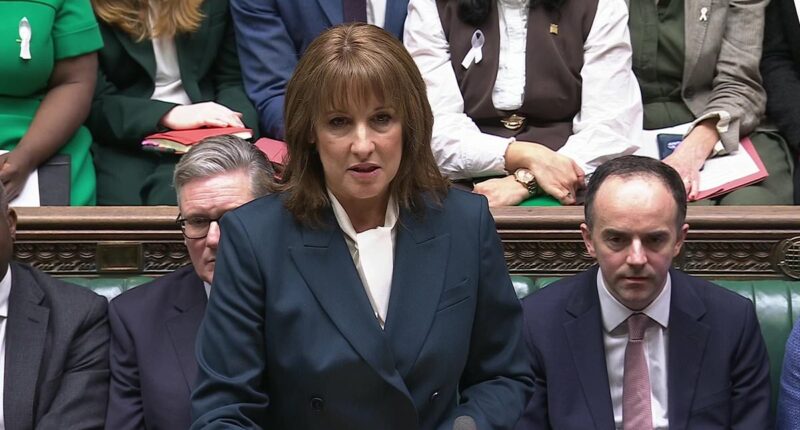Share this @internewscast.com
In today’s Budget announcement, Rachel Reeves has unveiled a significant tax increase totaling £26 billion as she confronts a downgraded forecast for economic growth.
As part of these measures, more than 1.7 million individuals will experience higher income tax obligations. This results from the decision to freeze tax thresholds, which will cause people to be pushed into paying taxes for the first time or to be shifted into higher tax brackets as their earnings rise.
These changes are set to elevate the tax burden to an unprecedented level by the fiscal year 2030/31.
In an unexpected slip-up, the Office for Budget Responsibility inadvertently released the full details of the Chancellor’s plans over 30 minutes prior to her formal presentation in the House of Commons.
Let’s break down the key tax increases and cost-of-living strategies outlined in today’s Budget:

Chancellor Rachel Reeves delivers her Budget in the House of Commons this afternoon
Income tax thresholds
The Chancellor has decided to maintain the freeze on income tax thresholds until 2030. This approach, previously dubbed a ‘stealth’ tax hike, is being framed by Ms. Reeves as a measure of ‘asking everyone to make a contribution.’
This will drag more people into paying the tax for the first time, and others into paying a higher rate as wages rise.
The OBR said the freeze in tax thresholds would result in 780,000 more basic-rate, 920,000 more higher-rate and 4,000 more additional-rate income tax payers in 2029/30, and estimated it will raise about £7.6billion in 2029-30.
The current income tax bands will stay as they are until April 2031 for taxpayers in England, Wales and Northern Ireland.
Scotland’s income tax bands are set by the Scottish government.
In the past, thresholds were increased each year in line with Consumer Prices Index (CPI) inflation, therefore better reflecting the rising cost of living.
But most thresholds have been held at their 2022-23 levels until April 2028 – and this has been extended for another three years.
Pensions and salary sacrifices
Ms Reeves will limit the amount of money people can put into their private pension pot, through a scheme called a salary sacrifice, before it incurs tax.
Anything above the new £2,000 cap will incur national insurance contributions from 2029, a move which has been estimated to raise £4.7 billion in 2029/30 and £2.6 billion in 2030/31. At the moment, there is no limit.
Salary-sacrificed pension contributions above an annual £2,000 threshold will no longer be exempt from national insurance from April 2029, according to a document published in ‘error’ ahead of the Budget.
The OBR document said that salary-sacrificed pension contributions above £2,000 would be treated as ordinary employee pension contributions in the tax system and therefore be subject to both employer and employee national insurance contributions.

Chancellor Rachel Reeves delivers her Budget in the House of Commons this afternoon
Two-child benefit cap scrapped
The controversial two-child benefits limit will be scrapped from April, at a cost of £3billion at the end of this Parliament.
Ditching the policy will result in an estimated reduction of child poverty by 450,000 by 2029/30, the Government’s independent spending watchdog said.
The Government had been under increasing pressure from anti-poverty campaigners, as well as many of its own Labour MPs, to end a policy introduced under the Conservatives.
Ms Reeves and Prime Minister Sir Keir Starmer had both hinted in the lead-up to the Budget that the cap could go.
The two-child limit – first announced in 2015 by the Conservatives and which came into effect in 2017 – restricts child tax credit and universal credit to the first two children in most households.
Organisations working in the sector argue 109 children across the UK are pulled into poverty by the policy every day.
The OBR said the Government had ‘removed the two-child limit within UC from April 2026’. It added that its removal will cost £2.3 billion in 2026-27 and £3 billion in 2029-30.
It said the Government estimates the change will reduce child poverty by 450,000 by 2029-30 ‘relative to the level had the two-child limit remained in place’.
Property taxes
A ‘high value council tax surcharge’ will be introduced on properties worth more than £2 million, a so-called ‘mansion tax’.
Four price bands will be introduced, rising from £2,500 for a property valued between £2 million to £2.5 million, to £7,500 for a property valued at £5 million or more, all uprated by inflation each year.
It will raise £0.4 billion in 2029-30, with all money going to central Government, rather than local authorities as usually happens with council tax.
Ms Reeves also announced taxes targeted at landlords, telling the Commons: ‘It’s not fair that the tax system treats different types of income so differently, and so I will increase the basic and higher rate of tax on property savings and dividend income by two percentage points, and the additional rate of tax on property and savings income by two percentage points.’
Rail fares frozen
Rail costs were frozen in the Budget, which the Government has said will save commuters on pricier routes more than £300 a year.
The move only covers regulated fares, which include standard class fares such as saver returns, standard returns, off-peak fares between major cities and season tickets for most journeys.
The policy does not apply to ‘unregulated’ fares include first class, advance purchase and saver tickets – with train operators remaining free to determine those fares.
The Government said the freeze is part of its plans to rebuild a publicly owned Great British Railways that will deliver value for money through bringing rail tickets into the modern age with tap in tap out and digital ticketing, alongside investing in superfast wifi.
The announcement applies to England and services run by English train operating companies.
Cash Isa limit cut
The annual cash ISA limit will be reduced from £20,000 to £12,000 a year for those aged under 65.
The overall allowance for under-65s will still be £20,000, but only £12,000 of it can be used for cash savings.
People aged over 65 will be able to put their full £20,000 allowance into cash Isas.
‘Someone who has invested £1,000 a year in an average stocks and shares Isa every year since 1999 would be £50,000 better off today … than if they’d put the same money into a cash Isa,’ Ms Reeves told the Commons.
Energy bills
The Chancellor said she was taking action to get energy bills down and cut the cost of living, with an average of £150 cut from the average household bill from next year.
Ms Reeves said she would do this by scrapping an ‘eco scheme’ introduced by the Tories in government, which she claimed had cost households £1.7 billion a year on their bills.
Electric vehicles tax
Drivers of electric vehicles (EVs) will have to pay 3p per mile they drive under a new tax introduced by the Chancellor, which is expected to rise annually with inflation.
The move is in part to make up for falling revenues from fuel duty, as more motorists move towards using EVs.
Fuel duty
Fuel duty is to be increased for the first time in 16 years.
The 5p per litre cut in duty introduced by the Conservative government in March 2022 will only be extended until September 2026.
It will be ‘reversed through a staggered approach’, the OBR said.
From April 2027, the Government has stated that fuel duty rates will be increased annually by the RPI measure of inflation, the document said.
Fuel duty has not risen since April 2010.
Motability
The Motability scheme, which helps disabled people with the cost of a car, will meanwhile no longer offer ‘luxury vehicles’, Ms Reeves said.
Gambling tax
Ms Reeves will increase the levy on ‘remote gaming’ like online gambling, from 21% to 40% next year, in a bit to deter people from a form of gambling associated with the ‘highest levels of harm’.
She will also abolish bingo duty in April 2026.
These steps are estimated to raise £1.1 billion by 2029-30.
Capital gains tax
Capital gains tax relief on business sales made to employee ownership trusts will be reduced from 100 per cent to 50 per cent.
Economic growth
The Office for Budget Responsibility (OBR) forecast gross domestic product would grow by 1.5 per cent this year, an increase from its earlier 1 per cent forecast.
But it downgraded growth in 2026 from 1.9 per cent to 1.4 per cent, in 2027 from 1.8 per cent to 1.5 per cent, in 2028 from 1.7 per cent to 1.5 per cent and in 2029 from 1.8 per cent to 1.5 per cent.
Fiscal headroom
The amount of headroom the Chancellor has against economic shocks has been raised by tax hikes in the Budget, according to the OBR.
Ms Reeves claimed in the Commons she would ‘more than double’ the fiscal headroom.
The leeway the Government has against the Chancellor’s day-to-day spending rule will widen to £22 billion in 2029-30, £12 billion more than in March, the Budget watchdog said.
In future, the Chancellor will ask the OBR to assess whether she is meeting her fiscal rules just once a year, in the autumn Budget, rather than twice a year.
Business taxes
The Chancellor said she would introduce ‘permanently lower’ business rates for more than 750,000 retail hospitality and leisure properties.
The rates, which Ms Reeves said would be the ‘lowest rates since 1991’ will be paid for through higher rates on properties worth more than £500,000, including the warehouses used by ‘online giants’.

















